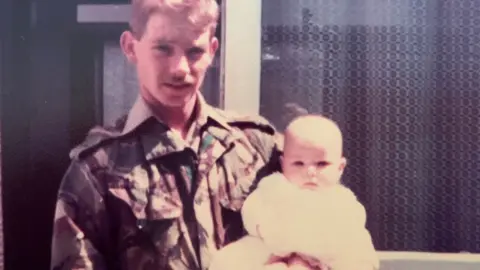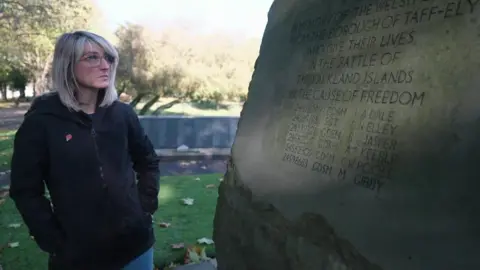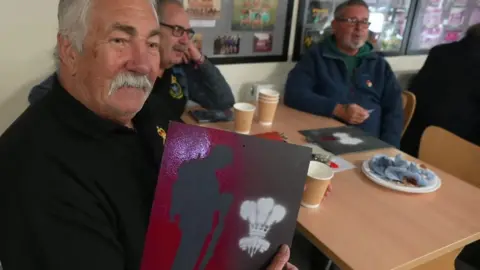PTSD: Falklands War veteran wants more support for armed services
For war veteran Paul Bromwell, only after seeking support for post-traumatic stress disorder (PTSD) did he realise how many others like him were suffering.
The Welsh Guardsman served in the Falklands War, the 10-week conflict in 1982 between Argentina and the UK.
After struggling to return to civilian life, Paul set up his own support group but said more could be done.
The Welsh government said veterans' NHS funding has been increased.
Those struggling were also urged to "reach out" to the specialist support available, by the UK government.
Recalling his traumatic past and eventually seeking help, Paul said: "The biggest thing was to find out that it wasn't only me."
After the war, Paul said he suffered sleeplessness, mood swings and became dependant on alcohol.
 Family photo
Family photoAll because of PTSD, he said.
"One of the biggest problems is that we drank too much. Every pub would shove a pint in your hand, and that never did us any favours. You become reliant on drink," he said.
"We drank ourselves stupid and that's how we survived. No-one stepped in and said you shouldn't be doing this."
Remembering the Falklands, Paul said: "The ships in the bay were firing on top of us. It's like something you'd never believe unless you were in it.
"I lost so many of my mates."
After receiving support, Paul set up Valley Veterans support group to help others like him.
He feels Wales could do more to offer help to war veterans, and follow the example of the United States.
"They've got VA hospitals (Veterans Affairs), they've got a place for the guys when they come out of service where they can live, they've got everything," he said.
"They've got jobs set up. If they're not capable of doing jobs they're looked after in other ways. What do we get? We fight for every scrap.
"We support each other, but there's not enough done for us."

Katie Gibby is a Valley Veterans volunteer, she was also diagnosed with PTSD in the years after her dad, guardsman Mark Gibby, was killed during the Falklands. He was on board the Sir Galahad ship when it was bombed in June 1982.
She said: "It shouldn't take a veteran to support the veterans, it should be in place and all there ready for them if they're going to be sent to war.
"When you have PTSD, it's very hard for people to understand. When you come into a community of veterans, they understand, they get you, they get your emotions, they get exactly how your mind works.
"This is a life my father would've lived, and it's just nice to know that I can be around, that I can give something back.

"Everybody tells me he was an absolutely lovely man, he had a heart of gold. I was five months old when he was killed so there's a lot I don't know about my father which I learned from people who knew him.
"We really need PTSD to be highlighted, it needs to be spoken about more.
"Mental health [awareness] is something that's really growing now. We're talking about it and we're being told that it's okay to talk, it's OK not to be OK."
A Welsh government spokesman said: "We recognise some Armed Forces veterans may need support at this time. We all owe our veterans a debt of gratitude and a duty of care, particularly when they develop health problems as a result of their military service.
"Veterans are entitled to priority access to NHS care for conditions associated to their time in the Armed Forces.
"We have increased funding for veterans' NHS Wales, the only specialised mental health service provision for veterans in the UK, to more than £900,000 a year and are working with partners to make veterans aware of this service."
The UK government also urged those who are struggling to access Veterans' NHS Wales.
"Before leaving the armed forces, service personnel have access to training, support and advice from the Defence Transition Services, to help them move successfully to civilian life," a spokesman said.
"We have stepped up funding for veterans, including a new £5m Veterans' Health Innovation Fund for next year to help ensure veterans who have suffered physical injury or mental health challenges during their service can access the most innovative and trailblazing new treatments."
Valley Veterans is based in Rhondda Cynon Taf, whose council said it "works closely with the group and its wider armed forces community".
An RCT spokesman said it offered "confidential support and guidance to veterans, as well as to their families," with "a wide range of assistance".

- SURVIVING HELMAND: Inspirational stories from those deeply affected by the conflict in Afghanistan
- TIP NUMBER 7: The families of Aberfan fight for justice

